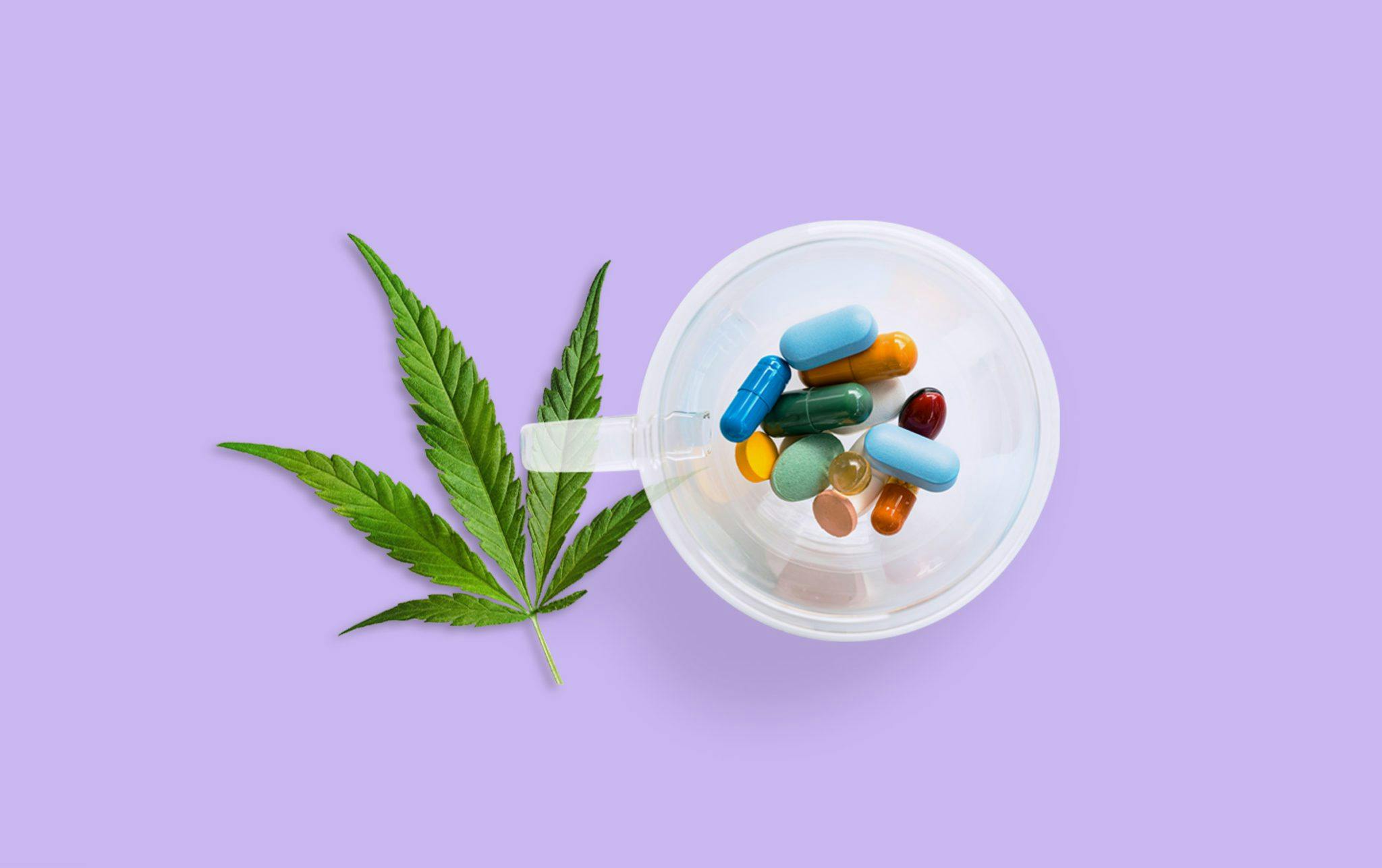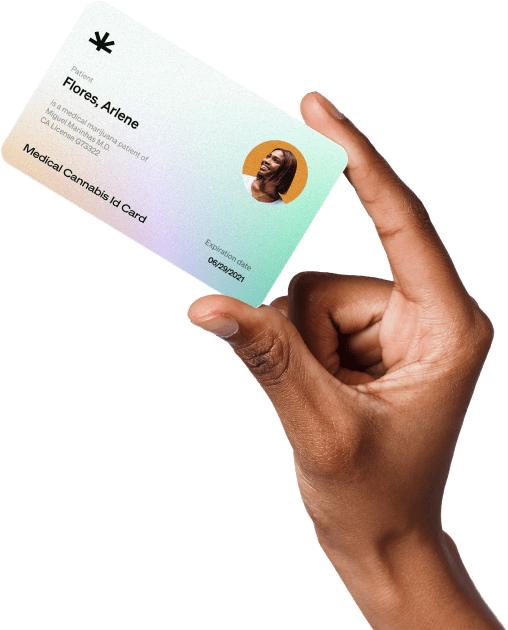Does Weed Interact With Any Medications?

Article written by

Tina MagrabiSenior Content Writer
Content reviewed by

Dr. Lewis JasseyMedical Director - Pediatric Medicine
If you consume cannabis, there are certain medication interactions that you need to be aware of. Although these potential interactions can be harmful, it is worth remembering that, in some instances, cannabis may help replace the need for more addictive or dangerous prescription drugs.
Here are some medical cannabis and possible drug interactions to avoid, or consider carefully and monitor closely, advisably with a physician’s input.
Note: The information in this article does not constitute medical advice. Consult with a medical professional on possible medication interactions before beginning a regimen of cannabis.
Get your medical marijuana card
Connect with a licensed physician online in minutes.
What Are Medication Interactions?
A medication interaction, known in clinical terms as a contraindication, occurs when a person takes two or more incompatible medicines together. Negative medication interactions can be severe and even life-threatening, which is why it is crucial to consult with your doctor before consuming marijuana.
The Grapefruit Effect
The liver is key to drug interactions with cannabis. Liver enzymes, particularly CYP3A4, metabolize and eliminate medical marijuana and other drugs from the body.
Aside from filtering out medical marijuana and other medications, the CYP enzymes are the primary culprits in causing drug interactions with cannabis. Cannabidiol (CBD) is one of the CYP3A4 inhibitors similar to grapefruit juice, hence the name “the grapefruit effect.”
How Marijuana Interacts with Common Medications
Marijuana may interact with many common medications, from over-the-counter painkillers to prescription anticonvulsants for people with epilepsy. Here are some contraindications to be aware of before you begin using cannabis.
Over-the-Counter Pain Medications
Over-the-counter (OTC) medications containing acetaminophen used in conjunction with cannabis may increase the risk of liver damage in rare cases. In addition, non-steroidal anti-inflammatory drugs (NSAIDs) can negatively interact with cannabis and lead to nervous system damage, including meningitis, while also increasing the risk of bleeding.
At the same time, cannabis may be used to reduce the intake of OTC pain meds, and thankfully there is little interaction between most non-opioid OTC pain medications.
Psychiatric Medications
Anxiety and depression are two common conditions medical marijuana cardholders hope to treat. Although research is incomplete, medical professionals urge caution concerning medical cannabis interactions with psych meds.
The United Kingdom’s National Health Service (NHS) points out that cannabis interacts with psychiatric medications. Cannabis drug interactions are particularly noted with tricyclic antidepressants (TCAs), such as Amitriptyline, Imipramine, and Dothiepin.
Suppose a medical marijuana cardholder uses medical cannabis while being treated with tricyclic antidepressants and notices a speedy heartbeat (tachycardia) or a spike in blood pressure (called hypertension when the spike endures). In that case, chances are a drug interaction with cannabis has occurred. Pause the medical cannabis use and consult a primary caregiver to be cautious.
There is a danger that cannabis interacting with tricyclic antidepressants will result in the medical marijuana cardholder becoming confused and restless and subject to hallucinations and mood swings.
If experiencing a medical cannabis interaction with tricyclic antidepressants and similar drugs, do not discontinue psychiatric medications except under the care of a physician. Quitting cannabis is usually far safer!
According to the NHS, insufficient research has been done on medical cannabis and possible drug reactions with certain antidepressants of the SSRI (Selective Serotonin Reuptake Inhibitor) family. The same source states that CBD and tetrahydrocannabinol (THC) interactions with the drug Lithium, used to treat bipolar disorder, appear benign.
Still, it’s not clear if CBD or THC is safe to take with Lithium.
Antibiotics
There is no definitive evidence that cannabis interferes with antibiotics and may make them more effective in some instances. But be sure to tell your prescribing physician if you intend to use cannabis while on a regimen of antibiotics.
Immunosuppressants
CBD is a natural immunosuppressant, so those using other immunosuppressant drugs (e.g., steroids such as Prednisone, anti-rejection tablets for organ transplants) should ask their physicians about any potential negative or positive interactions.
CBD could benefit kidney transplant patients, but more research is required in this area.
Opioids
CB1 receptors, which THC attaches to and causes a psychoactive effect, are found in many of the same areas of the brain as opioid receptors. Cannabinoid receptors can “talk” to opioid receptors and influence how they signal pain. This is one reason why cannabis can reduce painkiller intake and why painkiller intake must be tapered to reduce the chances of a synergistic effect and opioid overdose. There are significant interactions between opioids like codeine, hydrocodone, fentanyl, and cannabis.
Blood Thinners
Prescribed to treat and prevent blood clots, Warfarin can become too effective when the drug interacts with THC and CBD. THC and CBD interactions with the CYP2C9 enzyme can raise Warfarin levels, causing excessive bleeding. To be on the safe side, avoid using cannabis if you are taking a blood thinner.
Bronchodilators
People who have asthma, emphysema, or chronic bronchitis and are being treated with Theophylline for these lung conditions should beware of possible drug interactions with medical cannabis. Smoking medical marijuana speeds up the liver’s clearing out of Theophylline, weakening the drug’s effectiveness.
The drug’s interactions with cannabis may be less risky with edibles.
On the flip side, cannabinoids like THC and terpenes like pinene have bronchodilatory effects beneficial for patients suffering from such conditions.
Anticonvulsants
A multipurpose anticonvulsant, Valproate (Depakote, Epilim, Convulex), is prescribed to treat seizures, level out the manic episodes of bipolar disorder, and even mitigate migraine headaches.
Research indicates that taking cannabis or CBD with anticonvulsants like Valproate is not advisable.
Sedatives
Some sedatives may be incompatible with cannabis, while others may be tweaked to work in tandem with the plant.
Consider Clobazam, a sedative used to minimize seizures caused by Lennox-Gastaut Syndrome (LGS), a severe form of childhood epilepsy. CBD interacts with the drug Clobazam by increasing its effects. However, studies are conflicting, and some experts advise against using Clobazam with cannabis.
Other physicians take advantage of the CBD drug interaction by prescribing CBD with Clobazam. Taking into account the CBD interaction with the drug Clobazam, doses are adjusted to minimize its sedative side effects.
The Bottom Line: Mixing Marijuana with Other Medications
The key to mixing marijuana with other medications is to get the green light from your doctor first. In general, refrain from using cannabis with contraindicated medications like opioids, sedatives, and blood thinners. You will also want to avoid using cannabis with tricyclic antidepressants.
However, it is crucial to consider the various effects of different cannabinoids on the endocannabinoid system and other receptors. Different cannabinoids will have a different impact, so it’s essential to realize that not all cannabis is the same. You may also want to use cannabis to reduce or replace your need for many kinds of prescription medication, especially the more dangerous and addictive ones.
Experience the benefits of medical marijuana safely with your own MMJ card. Leafwell’s physicians are ready to help you apply online and guide you step-by-step through the process.
Get Your Medical Card
Connect with a licensed physician online in minutes.
Frequently Asked Questions
What drugs should not be taken with CBD?
Clinical studies have found that mixing prescription CBD (Epidiolex) with Valproate can elevate liver enzyme counts to a level that will cause permanent liver injury. Consult a doctor about potential medical marijuana/cannabis drug interactions if taking Valproate.
Is it considered dangerous to smoke weed while on antibiotics?
You should not smoke weed if you take antibiotics for a respiratory infection. Your respiratory system is already taxed in this situation, and both marijuana smoke and tobacco smoke can exacerbate the issue. Ask your doctor whether it is safe to smoke weed if you take antibiotics for a different reason.
Are there any medications that I shouldn’t take while smoking marijuana?
Yes, you should avoid smoking marijuana if you take certain blood thinners, sedatives, bronchodilators, opioid-based painkillers, and any other medications that your physician deems inappropriate.
